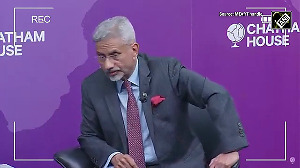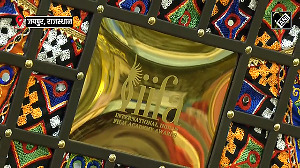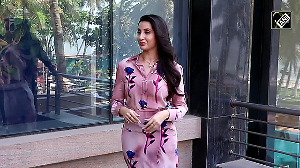Terror was the main subject during Israeli Prime Minister Ariel Sharon's two-day visit to India, his deputy said on Wednesday.
Addressing about 20 journalists at the Taj Mansingh hotel in New Delhi, where the Israeli delegation has been staying during the visit, Deputy Prime Minister Yosef Lapid said the "very reason that brought us to India is responsible for the cutting short of the visit: Terror."
"Terror is the most important issue of the 21st century. The phenomenon of terror is a growing factor internationally and can become a menace to the existence of mankind when terrorists get nuclear weapons," he said.
He said the main root of terror was fanatical Islam, and both nations had a common denominator in the form of Muslim minorities. "While we have full respect, as you do, towards the minority who live in our nations and have no quarrels with democracy, we have none for Muslim extremists who claim possession of our territory," Lapid said.
Saying Tuesday's attacks in Jerusalem and Tel Aviv -- the reason for the abrupt termination of Sharon's visit -- "was not the end of it," the Israeli leader said the "two nations must cooperate against the common enemy with support from America before it is too late."
"Israel can help by supplying electronic means, fences and gadgetry, which can be very helpful in India's fight against terror. India is now part of an international network which fights terror wherever it raises its head," he said, adding, "We speak a common language."
Describing the visit as a "real breakthrough in relations," he said each of the six agreements signed on Tuesday was a stepping stone towards closer relations.
At $1.3 billion, he added, India was Israel's 11th largest trading partner.
"We have the closest ties in defence," Lapid said. "We are the second largest supplier (of weapons) to India."
The Israeli deputy prime minister said the deal to supply three Phalcon airborne warning systems was virtually in the bag now that the Americans had withdrawn their objections. "This will ensure that your skies are under your eyes," he said.
On India's request to buy the advanced Arrow missile defense systems from Israel, he added, "we are negotiating the sale of the system, but we need American approval because they participated in its development."
"There is major cooperation in defence, agriculture and technology," he added."Israel is an arid country so we have the most advanced irrigation system which uses much less water. And this can be put to good use in the arid areas of India," Lapid said.
He said a team of important businessmen had accompanied Sharon's entourage to look at cooperation in technology, water, environment, even venture capital. However, "the less the government interferes in business, the better it is for business," he quipped.
"Israel and India together constitute more than a billion people. We have six million, the rest is yours," he joked.
"We are also the only democracies between here and the democracies in the West," he continued. "Both are ancient cultures which laid the foundations of ancient civilizations, and these are good fundamentals for a dialogue on the basis of mutual understanding."
"Indians and Jews have brains well-wired for computer technology," he said. "If you look at computer professionals in the world, they are mostly either Indians or Jews, and sometimes even Indian Jews," he said.
"There are 5,000 Jews in India and they have always enjoyed full freedom. We appreciate this," he said.
India-Israel relations that started developing slowly 11 years ago have come full flower with this visit, he said.
Israel respected India's relations with the Arab world and itself had good relations with Egypt and Jordan, and improving relations with Morocco. But while Israel was fully committed to the peace process, he reiterated that there would be peace only when the region accepted that the Jewish State is here to stay as an indestructible part of West Asia.
Arabs should not be disturbed, but applaud growing India-Israel relations, he said.
Asked about the US-Israel-India axis, he said, "If you are talking about a formal agreement, we don't envisage any such thing. But (there is) mutual interest in these nations in making the world a more secure place. American support for developing relations is creating such an unwritten axis. So, in an abstract sense, we are creating an axis."
"Our close ties are on issues of defence. Nobody can object if one county helps another in the field of defence. India has a right to self-defence. It is their right and we are glad to help," he said, when asked about Pakistan's apprehensions about India-Israeli defence relations.
Asked whether Israel would sell the same weapons to Pakistan if Islamabad established diplomatic ties with Jerusalem, he laughed and replied, "India has nothing to worry about."
"We don't want to get involved in the (Kashmir) dispute," he added, but "we respect India's sovereign right over Kashmir."
India and Israel are also working on halting illegal money transfers, a major source of financing of terror, he revealed. "In Israel we have a separate department working behind closed doors with computers to track this. For instance, if some money deposited in Chicago is moved to Jamaica, then to Europe before reaching terrorist outfits in Gaza. We can provide good know-how to India on this."
Both India and Israel, he felt, shared the same views on Palestine. "India wants a Palestinian State so do we. The day the Palestinians divorce terror, the road to peace is open. But till they do, they are up against definite opposition," he said.
Another factor was the Palestinian demand for the right to return, he added.
There are four million Palestinians in the world and they want to settle in Israel. "This means the destruction of Israel. We have a population of six million. If India were to suddenly get a population of 600 million Muslims coming to India, you wouldn't survive," he said.
While contending that Israel pre-empts nine out 10 suicide attacks, he said over the past three years, 850 Israelis had died in such attacks. "If we took the proportion of population, "it's like 175,000 Indians being killed by separatists."






 © 2025
© 2025